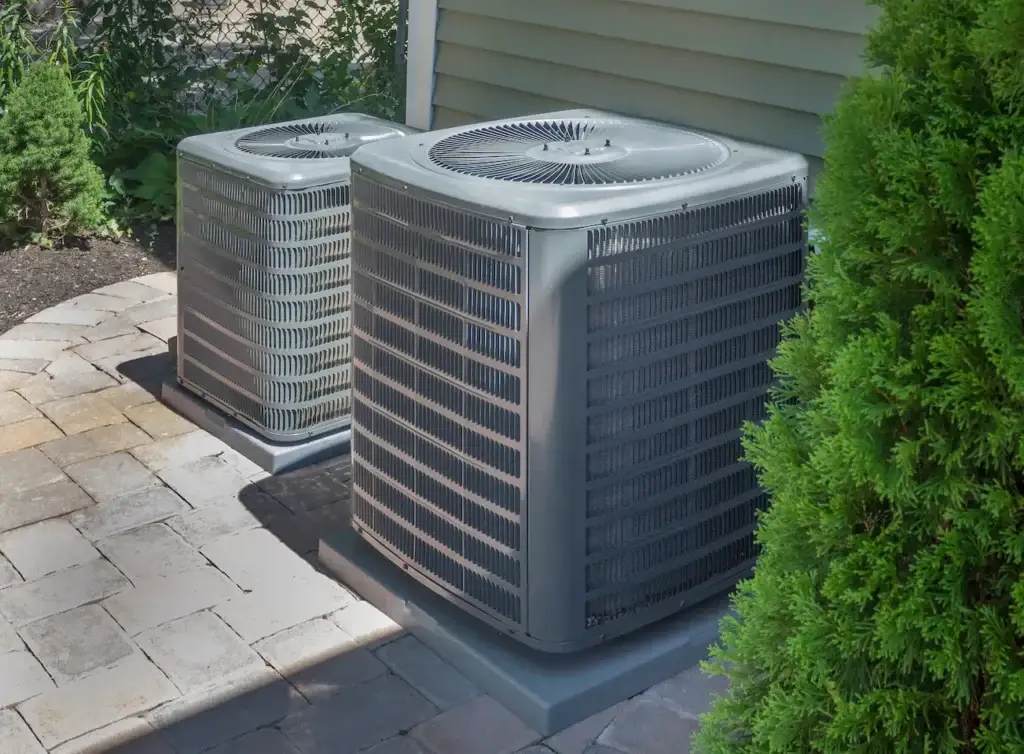May 22, 2023
Troubleshooting Guide for When Your Air Conditioner Fan is Not Working


As temperatures rise in the summer months, having a functional air conditioning system becomes increasingly important for maintaining a comfortable and healthy indoor environment. If you’ve noticed that your air conditioner’s fan is not working, it could be a sign of a more significant issue that needs to be addressed.
Bowman Mechanical Services, our Raleigh HVAC repair company, is sharing a troubleshooting guide to help you identify the cause of your air conditioner’s fan not working. Our aim is to provide homeowners with practical solutions to fix their air conditioner issues. By following these steps, you can ensure that your air conditioning system is functioning correctly and keep your home or business cool and comfortable during the hot summer months.
The Basic Parts of an AC Unit
An air conditioning unit is a complex system with several components that work together to cool and dehumidify indoor air.
Here are the basic parts of an AC unit:
- Compressor: The compressor is a pump that circulates the refrigerant through the AC system, compressing it into a high-pressure gas.
- Condenser coil: The condenser coil is located in the outdoor unit of the AC system and is responsible for releasing heat from the compressed refrigerant, converting it into a high-pressure liquid.
- Evaporator coil: The evaporator coil is located in the indoor unit of the AC system and is responsible for absorbing heat from indoor air, cooling it, and removing humidity.
- Refrigerant: Refrigerant is a chemical substance that circulates through the AC system, absorbing and releasing heat as it changes state from a gas to a liquid and back again into cold air.
- Expansion valve: The expansion valve regulates the flow of refrigerant from the high-pressure side of the AC system to the low-pressure side, where it can absorb heat from indoor air.
- Air filter: The air filter is responsible for trapping particles and pollutants in the indoor air, preventing them from circulating through the AC system and reducing indoor air quality.
- Thermostat: The thermostat is a device that controls the temperature of the indoor air by sending signals to the AC system to turn on or off.
The Role of the Air Conditioner Fan in an Air Conditioning System
The air conditioner’s fan plays a critical role in the overall function of an air conditioning system. It is responsible for circulating air throughout the system and helping to cool the air before it is dispersed into your home. The fan is typically located in the outdoor unit of the air conditioning system and is responsible for blowing air over the system’s condenser coils, which contain refrigerant that absorbs heat from the air.
As the fan blows air over the condenser coils, the heat is transferred from the refrigerant to the outdoor air, which cools the refrigerant. This process continues as the refrigerant circulates through the air conditioning system, absorbing heat from the indoor air and transferring it to the outdoor air through the condenser coils.
Additionally, the air conditioner’s indoor blower fan helps to circulate air throughout the home or building, distributing cool air to all areas and ensuring that the temperature remains consistent throughout. Without a functioning fan, the air conditioning system cannot cool the air effectively, leading to reduced comfort and potential health issues associated with high indoor temperatures.
Should the AC Fan Always Spin?
The fan of an air conditioner is designed to turn on and off as needed to maintain the desired temperature in the building, therefore, the AC fan should not always spin. If the fan is constantly running, it can cause unnecessary wear and tear on the system, reducing its lifespan and efficiency. In most cases, the fan will turn on and off in conjunction with the AC unit’s compressor, which is responsible for cooling the air.
Why is My AC Unit Humming but Not Spinning?
If your AC unit is humming but not spinning, it could be a sign of a problem with the fan motor or the capacitor, which is responsible for providing the fan motor with the electrical current it needs to run. A humming noise may indicate that the motor is receiving power but is not functioning correctly. In some cases, the problem may be as simple as a loose fan belt or debris that is preventing the fan from spinning. However, in most cases, it is best to contact a qualified HVAC technician to inspect and repair the problem to ensure that the system is functioning correctly and safely.
Reasons Why Your AC Fan is Not Working
There are several reasons why your AC fan may not be working correctly, and it is important to diagnose and repair the problem promptly to ensure that your system is functioning correctly. Let’s take a closer look at some of the various seasons your air conditioner’s fan is not working.
Faulty Fan Motor
The fan motor is responsible for powering the fan blades and circulating air throughout the air conditioning system. If the fan motor is faulty, it may not be able to spin the fan blades, leading to reduced airflow and cooling. A faulty fan motor may be caused by worn or damaged bearings, a faulty capacitor, or a burnt-out motor.
Tripped Circuit Breaker
The air conditioning system is connected to an electrical circuit, which is protected by a circuit breaker. If the circuit is overloaded, the circuit breaker may trip, cutting off power to the air conditioning system and causing the fan to stop working. In some cases, the circuit breaker may need to be reset, while in others, it may be a sign of a more significant electrical issue.
Clogged Air Filter
The air filter is responsible for trapping particles and pollutants in the indoor air, preventing them from circulating through the AC system, and reducing indoor air quality. If the air filter becomes clogged with dirt and debris, it can reduce airflow and cause the fan to stop working. This can also cause the evaporator coils to freeze, leading to reduced cooling efficiency and increased energy bills.
How to Fix Your Air Conditioner Fan
Fixing your air conditioner fan will depend on the specific issue that is causing it to not work correctly.
Here are some general steps that may help you fix your malfunctioning AC fan:
- Turn off the power: Before attempting to diagnose or fix your AC fan, turn off the power to the system at the circuit breaker or fuse box. This will help prevent any electrical shocks or accidents.
- Check the fan blades: Check the fan blades to ensure that they are not obstructed by debris or other objects. If the blades are dirty, clean them carefully using a soft brush or cloth.
- Check the fan motor: If the fan blades are clean and not obstructed, check the fan motor to ensure that it is working correctly. If the motor is not running or is making unusual noises, it may be faulty and require AC fan replacement services.
- Check the circuit breaker: If the fan is not working at all, check the circuit breaker to ensure that it has not tripped. If the breaker has tripped, reset it and try turning on the AC system again.
- Check the air filter: A clogged air filter can reduce airflow and cause the fan to stop working. Clean the air filter and replace it if necessary.
- Call a professional: If you are unable to diagnose or fix the problem with your AC fan, it is best to call a professional heating and cooling system contractor. They will have the knowledge and experience to diagnose and fix the issue quickly and safely.
When to Call a Professional
While some issues with your air conditioner fan can be fixed with basic troubleshooting steps, there are situations where it is best to call a professional HVAC technician.
Here are some signs that indicate you should call a professional:
- There is no power to the AC unit.
- The fan is making loud or unusual noises.
- The evaporator coils become frozen.
- You notice signs of electrical issues, like sparks, smoke, or burning smells coming from the AC unit.
Air Conditioner Fan Not Working FAQs
Can a clogged air filter cause the AC fan to stop working?
Yes, a clogged air filter can cause the AC fan to stop working. If the air filter becomes clogged with dirt and debris, it can restrict airflow and cause the evaporator coils to freeze. This can result in reduced cooling efficiency and increased energy bills, and can ultimately cause the fan to stop working.
How often should I replace my air filter?
The frequency of air filter replacement will depend on a variety of factors, including the type of filter, the level of indoor air pollution, and the usage of the HVAC system. As a general rule of thumb, it is recommended to replace standard 1-inch air filters every 1-3 months. However, pleated air filters can last up to 6 months, while electronic air filters can last up to 12 months. It is important to check the filter regularly and replace it when it becomes dirty or clogged.
How much does it cost to replace an AC fan motor?
The cost of replacing an AC fan motor will depend on several factors, including the type of motor, the size of the unit, and the labor costs of the HVAC technician. On average, the cost of replacing an AC fan motor can range from $200 to $600. However, this cost can vary significantly based on the specific circumstances of the repair.
If Your AC Unit Is Not Working, Contact The Pros at Bowman Mechanical Today
If you are experiencing issues with your AC unit fan, don’t hesitate to contact the professionals at Bowman Mechanical Services today. Our team of experienced HVAC technicians can diagnose and repair any issues with your cooling system, including a bad motor fan, quickly and efficiently. Our experts in air conditioners will ensure that you have a comfortable and safe indoor environment all summer long.
Contact us today by calling us at [phone] or filling out the contact form below.

